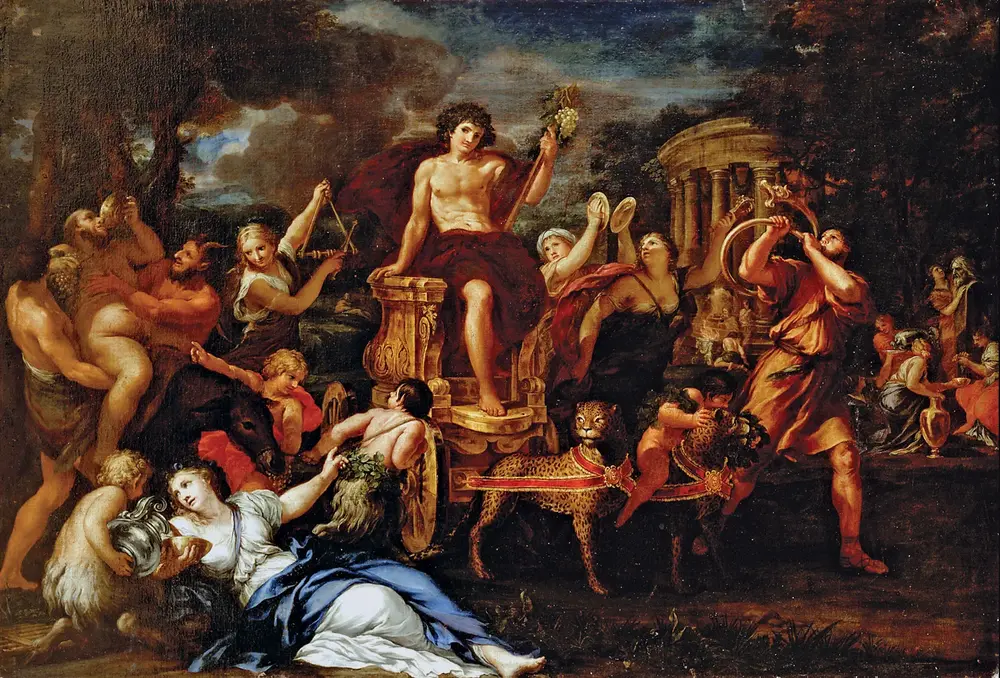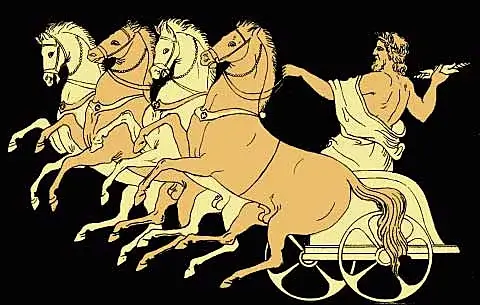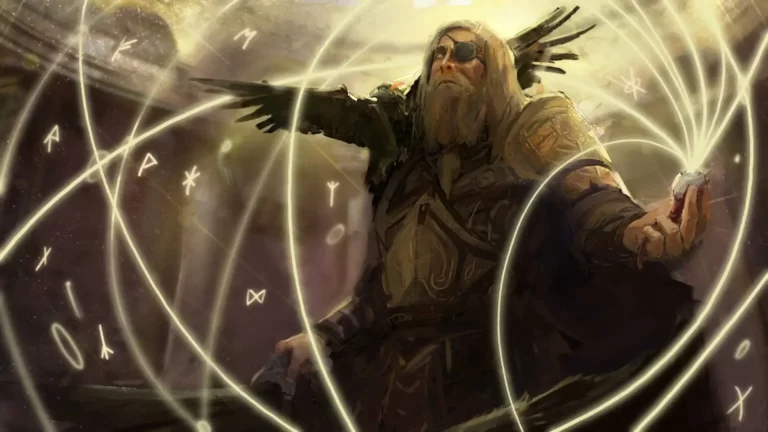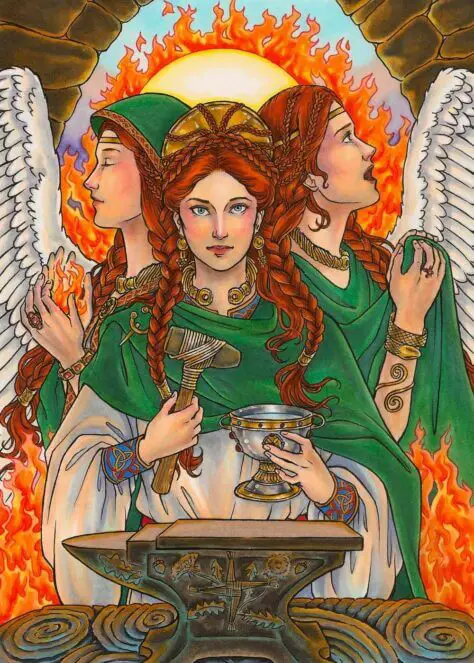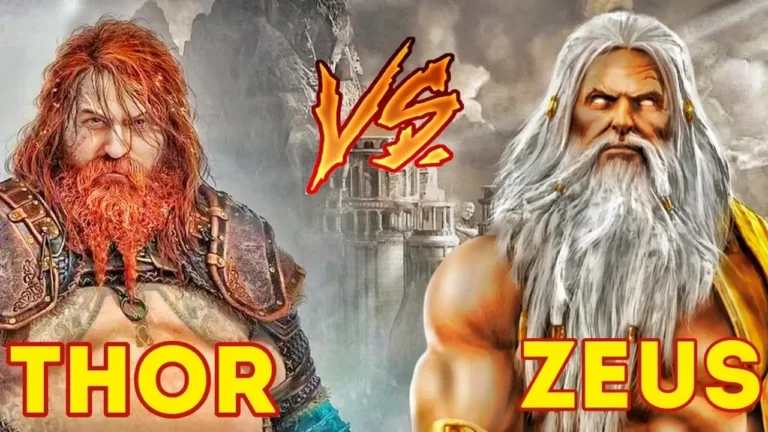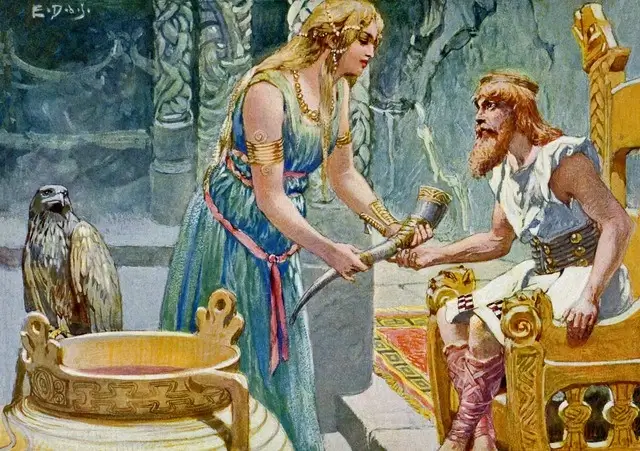Dionysus: The Olympian God of Wine, Ecstasy, and Theater
Dionysus is a prominent figure in Greek mythology and one of the twelve Olympian gods. He is most well-known as the god of wine, ecstasy, and theater. His story is one of divine birth, twice-born nature, and a cult that is rich in symbolism and mythology.
Introduction to Dionysus as an Important Olympian God
As an Olympian god, Dionysus held a revered place in ancient Greek society. He was considered to be one of the most important gods, with a rich and complex mythology that reflected the beliefs and values of the culture. His association with wine, ecstasy, and theater made him a particularly fascinating and beloved figure.
Explanation of the Domain and Symbolism of Dionysus
The domain of Dionysus was closely linked to the consumption of wine and the experience of ecstasy. He represented the wild, untamed aspects of life and the forces of nature, and his image was often associated with fertility and growth. In art and literature, he was depicted as a youthful androgynous figure or a powerful, bearded man wielding a thyrsus. The symbolism of the thyrsus, with its pinecone tip and ivy-wrapped shaft, was closely linked to the cult of Dionysus and represented the connection between the god, his followers, and the natural world.
Brief History of Dionysus’s Mythology and Cult
The mythology of Dionysus is rich and complex, with many variations and interpretations. His story begins with his birth from the union of Zeus and Semele, a mortal princess. From there, his story unfolds as he travels the world, spreading his cult and engaging in various adventures and exploits. The cult of Dionysus was characterized by ecstatic celebrations, ritualistic dancing, and the consumption of wine. Despite being viewed with suspicion by some elements of Greek society, the cult of Dionysus remained an enduring and important aspect of ancient Greek culture.
The Mythology of Dionysus
Dionysus is a complex figure in Greek mythology, with a rich and fascinating story that reflects the beliefs and values of ancient Greek culture. His story encompasses his birth, upbringing, journeys, adventures, and marriages.
The Birth and Upbringing of Dionysus
Dionysus was born to Zeus, the king of the gods, and Semele, a mortal princess. His divine birth was marked by tragedy, as Semele was consumed by lightning when she saw Zeus in his true form. Dionysus was rescued from his mother’s womb and sewn into Zeus’s thigh, where he continued to grow until he was ready to be born again. As a result of this “twice-born” nature, Dionysus was revered as a powerful and mysterious figure.
The Journeys of Dionysus
Dionysus was a god of many travels, wandering the world and spreading his cult throughout the Mediterranean. He was associated with both the east and the west, and his followers could be found in places as far apart as India and Spain. Dionysus was also closely linked to the sea, and his journeys often involved voyages across the water.
The Adventures of Dionysus
Dionysus was a god of many exploits and adventures, often depicted as a powerful and passionate figure who could inspire both love and fear. He was associated with both the wild, untamed aspects of nature and the more civilized aspects of Greek society, and his stories reflected the tension between these two forces. His adventures included encounters with monsters, battles with mortal and divine enemies, and journeys to the underworld.
The Marriages of Dionysus
Dionysus was a god of many marriages, with a diverse range of partners that reflected his complex nature. His wives included Ariadne, the daughter of King Minos of Crete; Aura, the goddess of the breeze; and Harmonia, the daughter of Ares and Aphrodite. Dionysus was also associated with many female followers, including the Maenads, who were known for their ecstatic dancing and wild celebrations.
The Symbolism of Dionysus
Dionysus was a god with rich and complex symbolism, reflecting his multifaceted nature as a deity of wine, fertility, ecstasy, and theater. His symbols included the thyrsus, the ivy wreath, and the duality of his nature as both beneficent and destructive.
The Association of Dionysus with Wine and Fertility
Dionysus was closely associated with wine and fertility, reflecting his role as a god of the vine and the harvest. He was also associated with the fertility of nature, and his cult celebrated the cycles of birth, death, and rebirth that were central to agricultural societies. In Greek mythology, Dionysus was often depicted holding a cup or a vine, and his followers would drink wine in his honor as a symbol of their devotion.
The Significance of the Thyrsus and the Ivy Wreath
The thyrsus and the ivy wreath were two of the most important symbols of Dionysus, representing his dual nature as both a god of wild, untamed nature and a patron of the arts and culture. The thyrsus was a staff topped with a pinecone, which was often used in the wild, ecstatic dances of the Maenads, Dionysus’s female followers. The ivy wreath, on the other hand, represented the more civilized aspects of Dionysus’s cult, symbolizing the connection between the god and the theater.
The Duality of Dionysus’s Nature as Both Beneficent and Destructive
Dionysus was a god of many contradictions, with a nature that was both beneficent and destructive. On the one hand, he was associated with the joy and ecstasy of life, inspiring creativity and passion in his followers. On the other hand, he was also a god of madness and chaos, capable of driving his devotees to wild, destructive behavior. This duality was reflected in his symbols, which included both the thyrsus and the ivy wreath.
The Connection of Dionysus with the Underworld and the Afterlife
Dionysus was also closely connected with the underworld and the afterlife, reflecting his role as a god of death and rebirth. In Greek mythology, he was often depicted leading souls to the afterlife or journeying to the underworld himself to bring back lost loved ones. This connection to the afterlife was reflected in the mysteries of his cult, which were often shrouded in secrecy and revealed only to initiates.
The Cult of Dionysus
The cult of Dionysus was one of the most significant and influential religious movements in ancient Greece, characterized by ecstatic rites, frenzied dancing, and a celebration of the god’s dual nature as both wild and civilized. The cult played a major role in the development of Greek culture and society, and its impact can still be felt today in various forms of theater and performance art.
The Origins and Development of the Dionysian Cult
The origins of the Dionysian cult are shrouded in mystery, with scholars disagreeing on whether the god was originally an import or an indigenous deity. What is clear, however, is that the cult grew in popularity in the Archaic and Classical periods of Greek history, spreading throughout the Mediterranean and beyond. The cult’s mythology and practices evolved, reflecting the changing beliefs and values of the societies that embraced it.
The Rituals and Practices of the Dionysian Cult
The rituals and practices of the Dionysian cult varied widely, depending on the region and period in which they were practiced. In general, however, the cult was characterized by ecstatic, emotional displays of devotion, often involving wild dancing, drinking, and sexual activity. The cult’s most famous ritual was the Bacchanalia, a nocturnal festival in which participants would drink wine and dance in honor of the god.
The Role of Women in the Dionysian Cult
Women played a central role in the Dionysian cult, both as participants and as leaders. The cult’s female followers, known as Maenads, were known for their wild, frenzied dances and their devotion to the god. They were also responsible for many of the cult’s most elaborate and theatrical rituals, which often involved elaborate costumes, masks, and props.
The Impact of the Dionysian Cult on Greek Society and Culture
The Dionysian cult had a profound impact on Greek society and culture, shaping the development of theater, art, and philosophy. The cult’s emphasis on the duality of nature and the power of transformation was reflected in the work of many Greek writers and artists, while its celebration of the ecstatic and the irrational helped to pave the way for the emergence of philosophy and science. Today, the legacy of the Dionysian cult can be seen in everything from contemporary performance art to the traditions of Mardi Gras and Carnaval.
Dionysus in Greek Art and Literature
Dionysus was one of the most popular and frequently represented gods in Greek art and literature, with countless depictions of him appearing in everything from sculpture and pottery to drama and poetry. His image was often used to symbolize the power of transformation and the duality of nature, and his cult was associated with the celebration of life, fertility, and the joy of living.
The Representation of Dionysus in Greek Art and Sculpture
Dionysus was often depicted in Greek art and sculpture as a young, beardless man with long hair, carrying a thyrsus and wearing a wreath of ivy leaves. He was often shown surrounded by revelers, musicians, and dancers, and his image was used to represent the wild, ecstatic nature of his cult.
The Portrayal of Dionysus in Greek Drama and Poetry
Dionysus was a major figure in Greek drama and poetry, and many of the most famous plays and poems of the era featured his exploits and adventures. In these works, he was often portrayed as a complex and contradictory figure, capable of both great kindness and terrible violence. His influence on Greek theater and drama was immense, with his cult’s emphasis on transformation and the power of the irrational helping to pave the way for the emergence of tragedy and comedy.
The Influence of Dionysus on the Development of Theater and Drama
The influence of Dionysus on the development of theater and drama cannot be overstated. His cult’s emphasis on the transformative power of ritual and the role of the actor in the creation of meaning helped to shape the emergence of theater as an art form. His image and mythology were also used as source material for many of the most famous plays and poems of the era, including the works of Aeschylus, Sophocles, and Euripides. Even today, Dionysus continues to be a major influence on contemporary theater and performance art, with his image and ideas continuing to inspire artists and audiences around the world.
Dionysus in Modern Culture
Despite being a figure from ancient mythology, Dionysus continues to be an influential and popular figure in modern culture. His image and mythology have been reinterpreted and adapted by countless artists, writers, and filmmakers, and his legacy continues to resonate with contemporary audiences around the world.
The Enduring Popularity of Dionysus in Popular Culture
Dionysus has remained a popular figure in popular culture for centuries, with countless books, films, and television shows featuring his image and mythology. His legacy has been embraced by everyone from rock musicians and performance artists to fashion designers and advertising executives, and his image continues to inspire and captivate audiences of all ages.
The Representation of Dionysus in Modern Literature, Film, and Television
Dionysus has been featured in numerous works of modern literature, film, and television, with his image and mythology, used to explore everything from the nature of desire and the search for identity to the relationship between the individual and society. His image has been reinterpreted and adapted by countless artists, writers, and filmmakers, with new interpretations and adaptations continuing to emerge to this day.
The Impact of Dionysus on Modern Philosophy and Psychology
Dionysus’s influence on modern philosophy and psychology has been immense, with his image and mythology used to explore everything from the nature of the self and the meaning of life to the relationship between the conscious and unconscious mind. His ideas have been embraced by everyone from Freud and Jung to contemporary philosophers and theorists, and his legacy continues to inspire new ideas and perspectives in fields as diverse as art, literature, psychology, and philosophy.
The Legacy of Dionysus
Dionysus has left an indelible mark on the cultural and intellectual history of Western civilization, and his legacy continues to be felt today. From his role in the development of Greek religion and mythology to his impact on the world of art, literature, and philosophy, Dionysus’s influence can be seen in every corner of contemporary society.
The Significance of Dionysus in the Development of Greek Religion and Mythology
Dionysus played a significant role in the development of Greek religion and mythology, with his image and mythology used to explore everything from the nature of the divine and the afterlife to the role of human beings in the world. His legacy can be seen in everything from the myths and legends of ancient Greece to the beliefs and practices of contemporary religious and spiritual traditions.
The Impact of Dionysus on the Cultural and Intellectual History of Western Civilization
Dionysus’s influence on the cultural and intellectual history of Western civilization has been immense, with his image and mythology inspiring countless works of art, literature, and philosophy. His teachings and values continue to inspire and challenge contemporary audiences, and his image remains a powerful symbol of the creative and transformative power of the human spirit.
The Relevance of Dionysus’s Teachings and Values in Contemporary Society
Dionysus’s teachings and values continue to be relevant in contemporary society, with his image and mythology used to explore everything from the nature of creativity and self-expression to the search for meaning and purpose in life. His legacy continues to inspire new ideas and perspectives in fields as diverse as art, literature, psychology, and philosophy, and his message of liberation and transformation continues to resonate with people around the world.
The Controversies Surrounding Dionysus
Dionysus has always been a controversial figure, with his image and mythology provoking both admiration and condemnation throughout history. From accusations of promoting excess and debauchery to criticism of the Dionysian cult for its subversive and anarchic nature, Dionysus’s legacy has been the subject of much debate and discussion.
The Role of Dionysus in Promoting Excess and Debauchery
One of the most controversial aspects of Dionysus’s legacy is his association with excess and debauchery. While many see him as a symbol of liberation and creative expression, others argue that his image and mythology promote a dangerous and destructive form of hedonism that can lead to moral decay and social breakdown.
The Criticism of the Dionysian Cult for Its Subversive and Anarchic Nature
The Dionysian cult has also been criticized for its subversive and anarchic nature, with some arguing that its emphasis on wild and chaotic behavior undermines the social order and threatens the stability of society. Others see the Dionysian cult as a powerful force for social change and liberation, challenging the status quo and promoting a more democratic and egalitarian vision of the world.
The Interpretation of Dionysus as a Symbol of Liberation and Social Change
Despite the controversies surrounding Dionysus, many see him as a symbol of liberation and social change, representing the transformative power of creativity and self-expression. His image and mythology continue to inspire new ideas and perspectives in fields as diverse as art, literature, psychology, and philosophy, challenging conventional wisdom and promoting a more expansive and inclusive vision of human potential.
Dionysus and the Other Olympian Gods
Dionysus was a unique god among the Olympian pantheon, as he bridged the gap between the natural and the supernatural worlds. His relationship with the other gods was complex and multifaceted, marked by conflicts and alliances. Dionysus was the son of Zeus and Semele, a mortal woman, which made him a half-god and half-mortal. This fact alone placed him in a different category than most of the other gods, who were born fully divine.
The relationship between Dionysus and the other Olympian gods
Despite his mortal origins, Dionysus was fully accepted as an Olympian god and was accorded the same respect and reverence as the other gods. However, his role and domain were somewhat different than those of the other gods. While the other gods were associated with specific domains such as war, wisdom, or love, Dionysus’s domain was more fluid and encompassed a wide range of activities, including wine, theater, fertility, and ecstasy.
The conflicts and alliances of Dionysus with the other gods
Dionysus’s relationships with the other gods were often marked by tension and conflict, as he challenged the status quo and disrupted the established order. He was often depicted as a rebel and an outsider, whose unconventional behavior and teachings were seen as a threat to the established order of things. At the same time, however, Dionysus was also able to forge alliances with other gods, such as Athena and Apollo, and to use his powers to benefit others.
The unique position of Dionysus as a god of both the natural and the supernatural realms
Overall, Dionysus’s unique position as a god of both the natural and the supernatural realms, and his relationships with the other gods, played a significant role in shaping his mythology and cult. His influence can be seen in many aspects of Greek culture and art, and his legacy continues to resonate in modern times.
